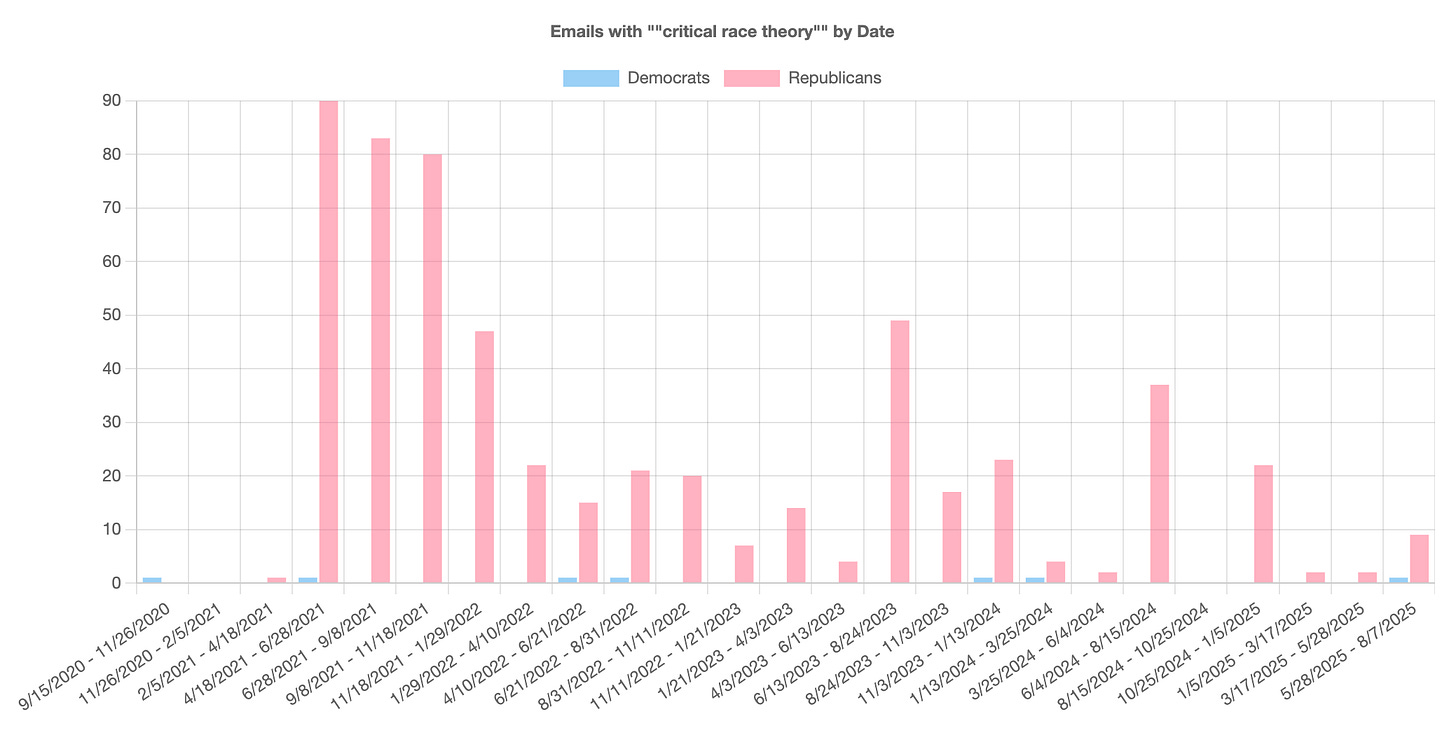If it were not for political geeks like Lindsey Cormack, who keeps track of what messages members of Congress send to their constituents, we wouldn’t have the objective data we need to test Third Way’s thesis that Democrats are losing because they speak in condescending esoteric gobbledygook that alienates and insults the average American voter.
For a party that spends billions of dollars trying to find the perfect language to connect to voters, Democrats and their allies use an awful lot of words and phrases no ordinary person would ever dream of saying. The intent of this language is to include, broaden, empathize, accept, and embrace. The effect of this language is to sound like the extreme, divisive, elitist, and obfuscatory, enforcers of wokeness. To please the few, we have alienated the many—especially on culture issues, where our language sounds superior, haughty and arrogant.
In reality, most Democrats do not run or govern on wildly out-of-touch social positions. But voters would be excused to believe we do because of the words that come out of our mouths—words which sound like we are hiding behind unfamiliar phrases to mask extreme intent.
Ms. Cormack tested this out and found it wanting.
Before I get to that, though, I want to stipulate that Third Way is on the right track. The Democrats are losing in part because voters associate them with words “no ordinary person would ever dream of saying.” And some of these words are quite popular in progressive circles and on college campuses. Third Way identifies 50 words/phrases that the Democrats should stop using.
The problem is that in Cormack’s database of congressional constituent communications, it turns out that Democrats don’t use most of these words/phrases very much. There are 12 that haven’t been used by any Democrats (or Republicans, for that matter) in her “archive of 208,000+ official congressional e-newsletters from 2010 to today.” There are a couple where there’s only one example and not from a Democrat. There are more than a dozen overall that have been used more often by Republicans.
Of the 50 word/phrases Third Way identified, Cormack only finds 17 that are used more by Democrats. Some examples include “patriarchy” (4 examples in 15 years, 3 by Democrats) and “heuristic,” (3 examples in 15 years from Terri Sewell (D), 1 from Paul Ryan (R)).
There are a few decent candidates still in the mix. “Food insecurity” and “housing insecurity” have been used dozens of times, overwhelmingly by Democrats. It’s probably better to talk about hungry kids living in cars if you want to get your point across.
There’s also the word “privilege.” It has been used 11,691 times by Republicans and only 4,492 times by Democrats. That might make it seem like it’s the Republicans who need to stop using the term, but the numbers actually reflect a different reality. The Democrats use the word a ton, and the Republicans very effectively and relentlessly mock them for it.
But even if Third Way has found a few good examples in their list of 50, their overall point isn’t supported by how Democratic candidates and officeholders actually communicate with the electorate. Cormack’s revelation is not that Third Way has been dishonest, but rather than they’ve been conned just like the American people have been conned. The Republicans have convinced them that Democrats use these words in political communications when it’s more often the Republicans who use them in order to mock progressive ideas.
Any politician who sends an e-letter to voters that includes a term like “cis gender” should have their head examined, but it’s only happened five times in 15 years, and only twice by a Democrat. The same is true of “critical race theory.”

What the Republicans have done here is take terms from academia and cast them as mainstream Democratic communications. And they’ve done this so relentlessly that they’ve convinced many analysts that the Democrats are guilty as charged of being out of touch elitists. They’ve also convinced much of the public of this, too.
But the assist the Democrats have given the Republicans isn’t really in the language that they use. It’s in the priorities they ignore. You will hear over and over from voters who side with the left on most things but don’t feel that the Democrats are focused on them and their difficulties as much as the climate or undocumented people or Trans Rights or even reproductive rights. The Dems are losing votes even from people who consider those issues important, because they’re not making sure that ordinary working folks of all races feel like the party has their back and puts them first.
The Republican language games are part of the formula here. Even if the Dems were working hard to win working class votes, they’d have to overcome relentless messaging that they’re really only concerned with allowing biological boys to play girls’ sports. But that just makes it clearer that cleaning up word games isn’t the answer. The Dems have to relentlessly focus their messaging on the issues that working people say they care about the most. Politics in 90 percent about convincing people you are on their side. The GOP understands this. The Dems often forget.








Well said, thanks. Fro a distance, it seems like Zohran Mamdani (despite being the child of a college professor) has done a good job with this. The simple truth is that the Democratic agenda (broadly speaking) allows for enormous flexibility in how politicians communicate with voters. Mamdani went out to different NYC neighborhoods after the 2024 election, talked with Biden-to-Trump voters, and concluded the #1 issue for them was the cost of living: freeze rents! municipal grocery stores! free buses! zero-cost childcare!
Is that his entire agenda? No. It’s just the agenda that he talks about relentlessly *because it’s what (he thinks) voters care about*. So far, it seems to be working remarkably well for him.
Closer to home, Boston mayor Michelle Wu is, by all available measures, cruising to re-election despite facing a very well-financed opponent who enjoys broad support from the downtown business community. There are a bunch of reasons for her 30+ point lead in the polls, but one is she’s consistently campaigned on (and has a decent record on) fighting for the issues that most Boston voters say they care about.
He then framed his entire primary campaign around cost-of-living issues.